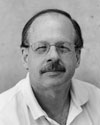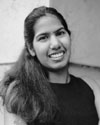
Fall
2002
Fall 2002
In a conversation with soundings contributing editor Orna Feldman, Professor Joshua Cohen discusses freedom of expression, campaign finance reform, and the trouble with political philosophy today.
Recipients of the Spring 2002 SHASS Infinite Mile Awards were announced in May.
Science Writing Program opens its doors
MIT's new graduate program in science writing hopes to influence both the discipline of science writing and the public understanding of science and technology.
The Burchard Scholars Program makes room in the MIT universe for questions without answers.
![]()
![]()
Soundings is published by the Dean's Office of the
School of Humanities, Arts, and Social Sciences at MIT
Comments and questions to shass-www@mit.edu
“It's an amazing experience...”
Planting seeds
The Burchard Scholars Program
Photos: Graham G. Ramsay.
 The Burchard Scholars Program is—let's face it—a bit of an outlier at MIT.
The Burchard Scholars Program is—let's face it—a bit of an outlier at MIT.
Why? For one thing, it's an academic endeavor in which grades, assignments, and competition are nowhere in sight. "It's one of the few places," explains Margery Resnick, director of the program from 1994 to 2000, "where there is room for questions that don't have answers." In a universe of problem sets and labs, this openness to the unanswerable can be refreshing for both students and faculty.
Here's how the program works. Each December for the past sixteen years a committee of SHASS faculty has selected 25 students with demonstrated interest and achievement in the humanities, arts, and social sciences from a pool of roughly 80 applicants. Beginning the following February, the Fellows take part in monthly dinner seminars focusing on a broad range of topics across the humanities and social sciences.
At each event, a faculty member makes a presentation on recent work they've been doing in their field. Other faculty members in related fields are also invited to participate in the evenings, and they lead discussions on the main subject (and often, other topics) over an elegant three-course dinner. Resnick notes that guests are asked to fan out across the dining room to encourage more student-faculty interaction: "We have an informal rule: no more than one person over the age of 25 at a table!"
Steve Meyer, Professor of Political Science and current head of the Burchard Scholars program, believes that the Burchard Program is valuable on two levels. First of all, it can be an important outlet for the chronically overworked MIT undergraduate. The Burchard Program gives students a bit of a respite in their hectic schedules, a chance to look around, talk to faculty (without the specter of grades anywhere in the picture), and take a breather from the demanding course work that defines much of their
MIT experience.
 Nirupama Rao, a current Burchard Scholar, and junior majoring in Economics and Management, is grateful for the time-out. "It's an amazing experience," she says. "We learn a lot from the presenters, and we also learn from each other. We're all happy to find other people that we can talk to about the humanities, and to take a few hours out of the scheduled week to explore our other interests."
Nirupama Rao, a current Burchard Scholar, and junior majoring in Economics and Management, is grateful for the time-out. "It's an amazing experience," she says. "We learn a lot from the presenters, and we also learn from each other. We're all happy to find other people that we can talk to about the humanities, and to take a few hours out of the scheduled week to explore our other interests."
A second—and equally important—benefit to the program is that it encourages students to look at the work that they're doing in the sciences from other angles. Meyer points out that MIT students have a unique advantage in today's world in their ability to both understand complex sciences, and to translate the application of these sciences across the broad range of human experience.
Meyer was drawn to the Burchard concept in part because of his own college experience:
"I was studying astrophysics in the early 1970s—a time during which everyone was questioning everything—and it made me think about the effect of what I was doing on the world at large. This led me to start thinking about the links between science and the larger world."
Meyer hopes that the Burchard evenings broaden MIT students' horizons in a similar manner. "The Burchard Scholars program is a bit like planting seeds," he says. "Unlike a physics lecture, there isn't a specific lesson that we want students to come away with. Instead, we hope that discussing new and interesting subjects in the arts and humanities will get them thinking in new and interesting ways. We hope it's an experience that will continue to bear fruit in their lives after the Burchard Program, and after MIT."
Meyer and Resnick agree that the program also broadens the experiences of faculty that take part, either as guest lecturers or as visitors. According to Meyer, "The program often introduces faculty to the interesting work that their colleagues are doing right down the hall."
For Dara O'Rourke, a 1988 Burchard Scholar (and now an assistant professor in the Department of Urban Studies and Planning), the seeds planted in his Burchard year have borne some interesting fruit. O'Rourke, who started MIT as a mechanical engineering major, says that for him, the Burchard Program functioned as a bridge between engineering and the humanities. O'Rourke's experience with the Burchard Program helped convince him to pursue a joint degree with political science—a choice that strongly influenced his career path after graduation.
O'Rourke, who's now working on monitoring the environmental and labor practices of multinational firms, puts it this way: "I'm still an engineer, but I'm a 'broader' engineer—an engineer who can not only solve problems and answer questions, but can also surface problems, and pose questions. For example, why do industries around the world still rely on sweatshops? That doesn't require a quantitative answer; it's something that we need to have a social dialogue about."
And nurturing dialogues—and planting the seeds that initiate them—is what the Burchard Scholars program is all about.
![]()
Copyright © 2002 Massachusetts Institute of Technology